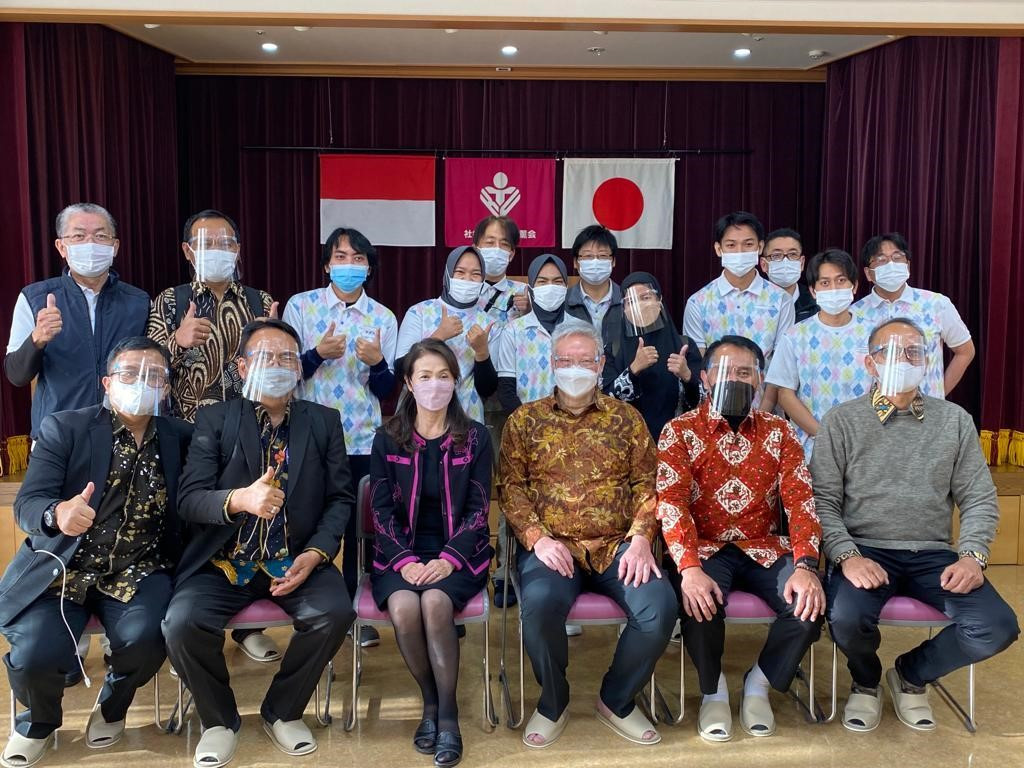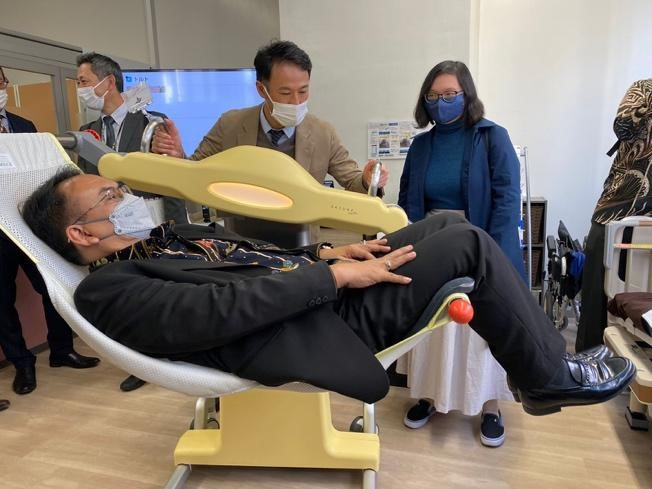Popular Reads
Top Results
Can't find what you're looking for?
View all search resultsPopular Reads
Top Results
Can't find what you're looking for?
View all search resultsMoSA study social rehabilitation, disaster management best practices on Japan trip
Change text size
Gift Premium Articles
to Anyone
D
elegates from the Social Affairs Ministry visited Japan on a three-day trip to study best practices in social rehabilitation services management and vulnerable groups, as well as disaster mitigation in the Land of the Rising Sun.
Under the direction of Social Affairs Minister Tri Rismaharini, the 15 delegates were divided into two teams, with the first team led by secretary-general Harry Hikmat and the second team by inspector general Dadang Iskandar.
Team 1 comprised head of the Temanggung Kartini Center Rachmad Koesnadi, head of the Abiyoso Cimahi Center Agung Hendrawan, head of the Jakarta Handayani Center Romal Uli Jaya Sinaga, head of Phalamarta Center in Sukabumi Cup Santo and planner from the Planning Bureau, Rabiah.
Team 2 comprised head of Inten Soeweno Center M. Royani, head of Pangudi Luhur Center I Ketut Supena, head of Naibonat Center Supriyono, head of Darussa’adah Susi Mulyati, head of the Organization and Human Resources Bureau and technical team of Social Affairs Minister M. Arif.
In Kitakyushu City, Team 1 visited a number of locations, including a children’s rehabilitation center, Sun Aqua Toto, the Social Welfare Center Plaza, a nursing home/rehabilitation center for the elderly, a disaster-prevention center, and various shops that sell disability products.
The first day’s itinerary consisted of the children’s rehabilitation center in Kitakyushu and Sun Aqua Toto, a subsidiary of Toto, which employs 90 employees with disabilities, approximately 65 percent of its 160 total employees.
Speaking to Sun Aqua Toto vice president Yuko Tomoguchi, secretary-general Harry said that the Social Affairs Ministry had implemented the ATENSI Program, which uses the three approaches of family, community and residential. In 2022, the program reached more than 250,000 beneficiaries, and will continue to grow.
The Social Affairs Ministry manages 31 centers that serve social rehabilitation and vulnerable groups, as well as shelters for children with chronic diseases.
On the second day, the delegates visited the Social Welfare Center Plaza in Kitakyushu city, which is equipped with various smart assistive devices for people with disabilities such as smart beds, robotic pets, laptops with eye and movement sensors, and various robotic wheelchairs equipped with artificial intelligence (AI).
The delegates were welcomed by Kubota Koji, executive director of the Planning and Coordination Bureau, Foreign Department Kitakyushu city.
Harry explained that the Social Affairs Ministry had made a number of innovations to optimize the use of technology for persons with disabilities and to improve elderly accessibility.
“There are adaptive walking sticks, electric multi-purpose wheelchairs, hot water sensors, and three-wheeled motorbikes,” he said, adding that the work on the various assistive devices involved persons with disabilities.
"This visit to the social welfare center is an inspiration for us to make another breakthrough to apply AI in making various assistive devices for persons with disabilities and the elderly."
On the third day, the Team 1 delegation visited the Fukuoka Citizens' Disaster Prevention Center, which is the command center for before, during and after a disaster.
The delegation was welcomed by the director of the Fukuoka City Disaster Mitigation Center Yoshimitsu Hayashi, as well as the director of Foreign Affairs of the Fukuoka city government Matsuda Masato.
Harry highlighted Indonesia’s similarities with Japan, where both countries have a fairly high frequency of disasters caused by volcanic activity, tectonics and hydrometeorology.
"Japan is known as a country that is mature in managing the impact of disasters and successful in educating its citizens in dealing with disasters. This mitigation center is proof of that," he said.
A similar mitigation center by the Social Affairs Ministry is the Disaster Emergency Response Unit (Tagana) Center in Bogor regency, West Java.
Delegates were given the opportunity to take part in disaster simulations, ranging from fires and floods to earthquakes. Suhadi Lili, special staff for human resource development and ministry programs at the Social Affairs Ministry, expressed his amazement and gratitude for the simulation.
Under the direction of the social affairs minister, a social storage was developed to bring logistical assistance closer to the disaster site.
At the end of the tour, the group was received by Indonesian Ambassador to Japan Heri Akhmadi at the Indonesian Embassy in Tokyo. Ambassador Heri emphasized his commitment to strengthening the Social Affairs Ministry’s programs and policies under the leadership of Social Affairs Minister Risma.
One of the commitments of the Indonesian Embassy in Japan is to purchase and market batik products produced by persons with disabilities assisted by the Social Affairs Ministry centers.
"Batik products made by persons with disabilities who are assisted by the Social Affairs Ministry’s centers are very good in quality. We are ready to buy and market them," said Heri.
Harry expressed his hope that the Indonesian Embassy could provide convenience and serve as a bridge between the ministry and the Japanese government in following-up the process should the cooperation be formed in the future.
"We hope that the Indonesian Embassy will support the best practice study results as directed by Social Affairs Minister Risma, especially if there is cooperation between the Social Affairs Ministry and various parties in Japan," said Harry.
Meanwhile, Team 2 under the leadership of inspector general Dadang Iskandar visited the Japan College of Social Work (JCSW), Aichi Shukutoku University and a home for the elderly. On the first day, the team visited the JCSW in Chiba City, where they were received by the chairman of the Chair Haniwa Natori Foundation and the chancellor of the JCSW.
During the visit, Dadang explained several programs of the Social Affairs Ministry in helping and improving people's welfare.
Meanwhile, JCSW teacher Taishi Arimura explained that the JCSW focused on the science of child welfare, where the college once supported Indonesian children who were survivors of the Aceh tsunami. The JCSW also supports the psychological recovery of child victims of abuse, violence and neglect in Japan.
The Japanese government has created a support system in local government, opening a shelter as a rehabilitation and protection service, while also strengthening the care system.
The second day was also spent at the JCSW, where the delegation was briefed on services for persons with disabilities that are based on strong regulations. State obligations are realized by providing medical care, education, career counselling and career promotion, along with providing insurance for persons with disabilities.
In Dadang's observation, education in Japan has synchronized theory and practice.
“The campus facilities are very good, 96 percent of graduates succeed in entering the appropriate work field," he said.
"The JCSW has proven that the education system is very organized, including preparing human resources who focus on social services," said Faozan Amar, special staff for relations and partnerships with foreign agencies at the Social Affairs Ministry and a member of the Team 2 delegation.
On the third day, the delegation visited Aichi Shukutoku University and an elderly home, in Nagakute City, Aichi prefecture. Aichi Shukutoku University focuses on social welfare disciplines.
Meanwhile, the visit to the elderly home found that a very complete set of tools is provided at the facility, while the ratio of staff to the elderly is ideal so that services can be maximized.
According to Faozan Amar, this meeting was focused on exchanging information regarding social problems in each country.
"The meeting will be followed up with an MoU between the two parties," he said.











